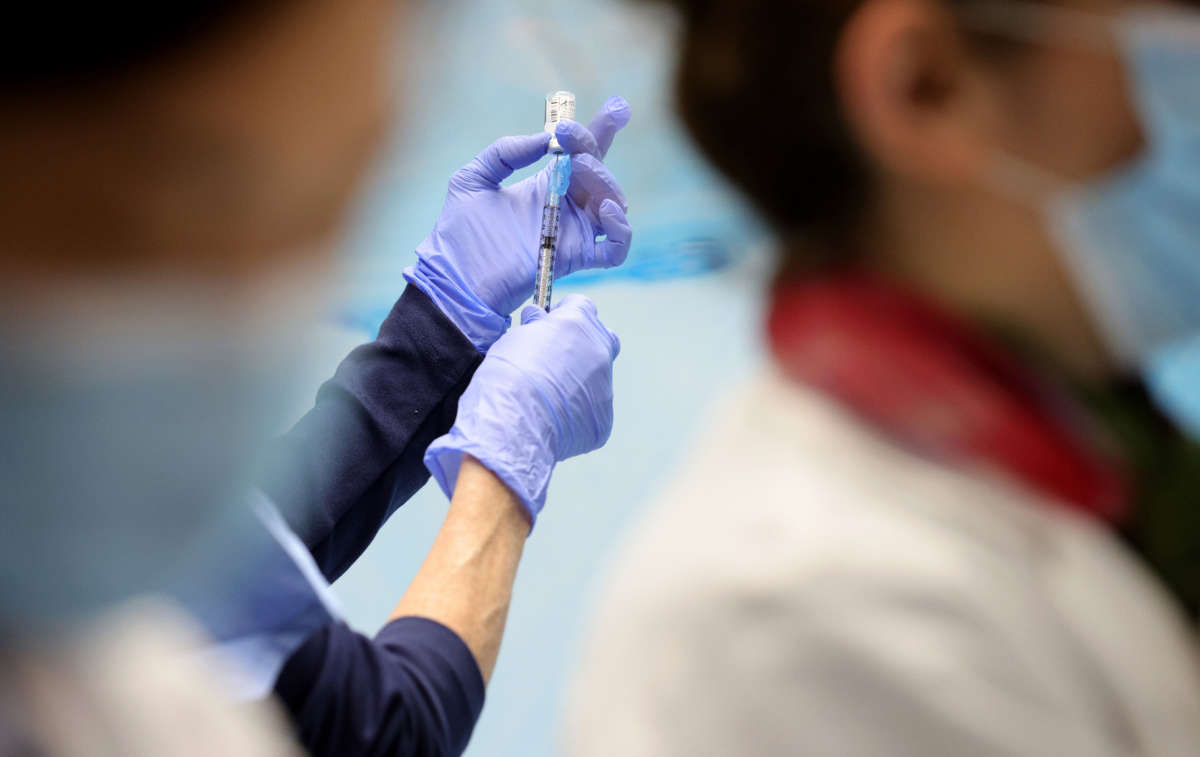Support justice-driven, accurate and transparent news — make a quick donation to Truthout today!
As President Donald Trump praises his administration’s handling and delivery of several thousand doses of coronavirus vaccines, several governors across the country have expressed misgivings over what will happen next week, after federal officials told them to expect cuts of up to 40 percent in anticipated dosage numbers.
Hundreds of thousands of Americans, mostly health care workers, have been vaccinated as of Friday.
“The Vaccine and the Vaccine rollout are getting the best of reviews. Moving along really well. Get those ‘shots’ everyone!” Trump tweeted on Thursday.
But governors and health leaders have expressed worries over distribution of the Pfizer-BioNTech version of the vaccine, which was sent out this week, after federal officials told them that the shipments being sent out next week would be significantly fewer than originally expected.
The federal government gave state leaders few details about why shipments would be down. Two Trump officials, speaking to The Associated Press on the matter, explained that the delivery reduction was due to changes to schedules and misunderstandings about supply changes.
Gov. Jay Inslee (D-Washington) blasted the administration’s handling of the rollout of vaccines, as many states are set to see reductions in expected dosage rates between 25 percent to 40 percent.
“This is disruptive and frustrating,” Inslee wrote in a tweet. “We need accurate, predictable numbers to plan and ensure on-the-ground success.”
.@CDCgov has informed us that WA’s vaccine allocation will be cut by 40 percent next week — and that all states are seeing similar cuts.
This is disruptive and frustrating. We need accurate, predictable numbers to plan and ensure on-the-ground success.
No explanation was given.
— Governor Jay Inslee (@GovInslee) December 17, 2020
Washington State was told to expect cuts of the Pfizer vaccine by as much as 40 percent next week. The same rate cut is expected in California, which has been hit hard by the pandemic in recent weeks. Missouri may also see a cut in its vaccine numbers as high as 30 percent.
For its own part, Pfizer has said that nothing on its end has changed, as far as production and rollout.
“Pfizer has not had any production issues with our COVID-19 vaccine, and no shipments containing the vaccine are on hold or delayed,” Pfizer spokesman Eamonn Nolan said.
The pace of vaccination may increase next week anyway if the Moderna version of the vaccine gets federal authorization. The Food and Drug Administration (FDA) is expected to grant approval for the vaccine on Friday.
Beyond the latest snafus, Trump’s glowing praise of his administration’s efforts to roll out vaccines for coronavirus may be premature for another reason: Most Americans will not be able to get a vaccine for quite some time. Even with the Moderna version of the vaccine included, only 150 million Americans — less than half the country’s population — will be able to receive a vaccine by June, due in large part to the administration’s failure to purchase enough dosages of both vaccines earlier this year.
For the vaccines to be effective, most experts agree, at least 70 percent of the population has to be inoculated.
Since the start of the pandemic, more than 17.2 million Americans have tested positive for the virus. As of Friday morning, more than 310,000 have died due to coronavirus.
A terrifying moment. We appeal for your support.
In the last weeks, we have witnessed an authoritarian assault on communities in Minnesota and across the nation.
The need for truthful, grassroots reporting is urgent at this cataclysmic historical moment. Yet, Trump-aligned billionaires and other allies have taken over many legacy media outlets — the culmination of a decades-long campaign to place control of the narrative into the hands of the political right.
We refuse to let Trump’s blatant propaganda machine go unchecked. Untethered to corporate ownership or advertisers, Truthout remains fearless in our reporting and our determination to use journalism as a tool for justice.
But we need your help just to fund our basic expenses. Over 80 percent of Truthout’s funding comes from small individual donations from our community of readers, and over a third of our total budget is supported by recurring monthly donors.
Truthout has launched a fundraiser to add 379 new monthly donors in the next 6 days. Whether you can make a small monthly donation or a larger one-time gift, Truthout only works with your support.
